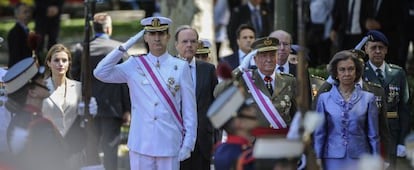Juan Carlos to become reserve commander-in-chief once Felipe is king
Prime minister praises “normality” of royal handover as proof of Spaniards’ democratic maturity

King Juan Carlos will become reserve commander-in-chief of Spain’s armed forces once his abdication comes into effect on Thursday. Spain will thus have two commanders-in-chief, Felipe VI and Juan Carlos I, the former active and the latter in reserve. This is not to say that the 76-year-old king may still be called upon to lead the armed forces, but that in military terms he will not be “retired.” Defense Minister Pedro Morenés announced the decision in Dakar, Senegal, where he was visiting the Marfil detachment that provides air support to Operation Serval, launched by France a year-and-a-half ago to stop the advance of jihadists in Mali.
According to current military personnel law, the king ought to pass directly into retirement. But the government has opted to apply the 1989 law that was in effect when Juan Carlos should have retired. This states that generals do not retire when they reach the age of 65, but pass into the “second reserve.” From an administrative point of view there is no difference: in both cases they can still use the uniform, participate in military ceremonies and receive treatment in keeping with their rank. But the image that being in the reserve transmits is that generals never retire. By opting for this formula, the government also wanted to avoid discriminating against Juan Carlos in relation to those who graduated from the military academy with him, who would have received similar reserve status when they retired.
The normality with which the succession is being carried out is the best proof of the solidity of our institutions” Prime Minister Mariano Rajoy
A third option was to name Juan Carlos honorary commander-in-chief, but that was ruled out because it was conceived as a promotion for those who would have been active, which is not the case of the king.
Meanwhile, Prime Minister Mariano Rajoy has praised the “normality” with which the handover of the crown was taking place, citing it as proof of Spaniards’ maturity. “This week, which is a special one for all Spaniards, they are going to give one more demonstration of that maturity,” said the Popular Party (PP) leader at a breakfast meeting organized by Europa Press. “With the proclamation of Felipe VI we Spaniards are reaffirming ourselves in our commitment to democratic stability through the connections and symbols that unite us all in solidarity and harmony.”
Rajoy went on to say that this maturity and stability were what would help Spain’s economic recovery, he insisted that, just when the PP and Socialists’ poor results in the recent European elections have put many on alert, the country’s institutions were stable.
“The transparency and normality with which the succession to the crown is being carried out is the best proof of the solidity of our institutions and of the social consensus around our Constitution and our democracy; we are giving a magnificent image to the world and because of all that I think that we Spaniards ought to congratulate ourselves.”
Tu suscripción se está usando en otro dispositivo
¿Quieres añadir otro usuario a tu suscripción?
Si continúas leyendo en este dispositivo, no se podrá leer en el otro.
FlechaTu suscripción se está usando en otro dispositivo y solo puedes acceder a EL PAÍS desde un dispositivo a la vez.
Si quieres compartir tu cuenta, cambia tu suscripción a la modalidad Premium, así podrás añadir otro usuario. Cada uno accederá con su propia cuenta de email, lo que os permitirá personalizar vuestra experiencia en EL PAÍS.
¿Tienes una suscripción de empresa? Accede aquí para contratar más cuentas.
En el caso de no saber quién está usando tu cuenta, te recomendamos cambiar tu contraseña aquí.
Si decides continuar compartiendo tu cuenta, este mensaje se mostrará en tu dispositivo y en el de la otra persona que está usando tu cuenta de forma indefinida, afectando a tu experiencia de lectura. Puedes consultar aquí los términos y condiciones de la suscripción digital.








































